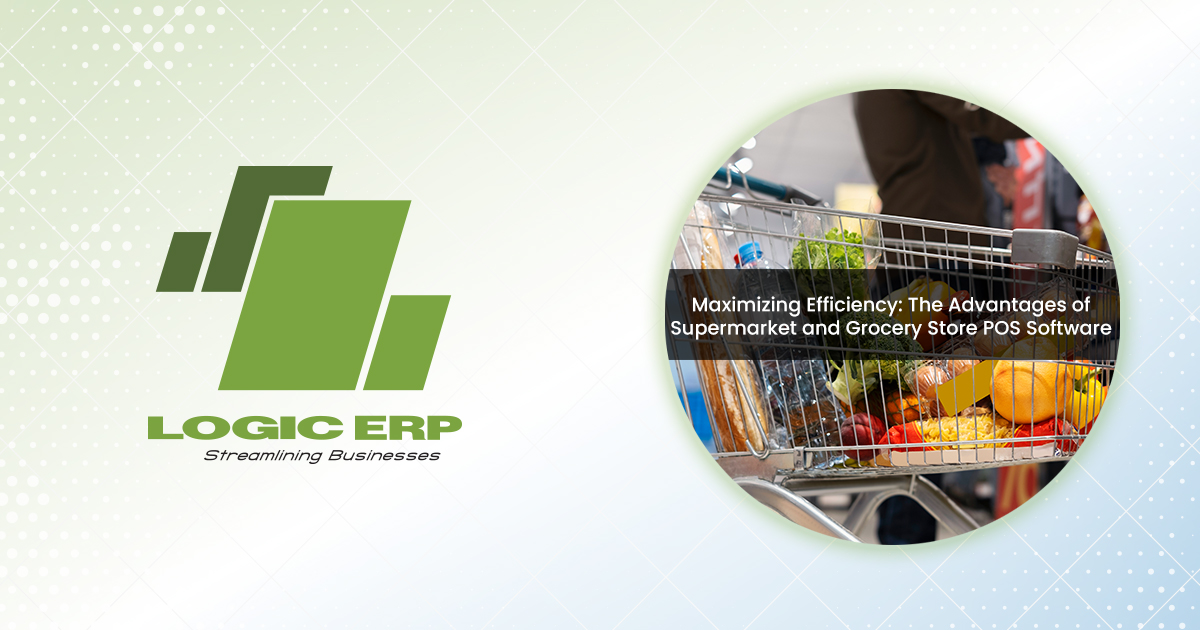

In the dynamic landscape of retail, supermarkets and grocery stores face unique challenges in managing inventory, streamlining operations, and delivering excellent customer service. As technology continues to evolve, the adoption of Point of Sale software has become increasingly essential for these businesses. It offers a myriad of benefits that enhance efficiency, accuracy, and customer satisfaction. Let’s delve into five compelling reasons why adopting POS software is a game-changer for supermarket and grocery store owners.
-
Efficient Inventory Management:
Supermarkets and grocery stores deal with a vast array of products, ranging from perishable goods to household essentials. Managing inventory manually can be a daunting task prone to errors and discrepancies. With retail POS systems, inventory management becomes seamless and efficient. The software provides real-time updates on stock levels, allowing store managers to monitor inventory levels accurately. Automated alerts for low stock items enable timely replenishment, reducing instances of stockouts and improving customer satisfaction. Additionally, POS software facilitates categorization and tracking of products, making it easier to identify fast-moving items and optimize shelf space for maximum profitability.
-
Enhanced Customer Experience:
In today’s competitive retail landscape, delivering exceptional customer service is paramount for sustaining business growth. Supermarket POS software empowers staff to serve customers more efficiently, leading to an enhanced shopping experience. Through this checkout processes are expedited, reducing wait times and minimizing queues during peak hours. Integrated customer relationship management (CRM) features enable personalized interactions by capturing customer preferences and purchase history. It facilitates flexible payment options, including contactless payments and mobile wallets, catering to the preferences of modern consumers. By prioritizing customer satisfaction, supermarkets and grocery stores can foster loyalty and drive repeat business.
-
Streamlined Operations:
Managing diverse operations within a supermarket or grocery store requires seamless coordination across various departments. Retail POS software serves as a centralized platform that streamlines operations and enhances productivity. From inventory management to employee scheduling, it automate repetitive tasks, freeing up valuable time for staff to focus on strategic initiatives. Advanced reporting and analytics tools provide actionable insights into sales trends, profitability, and customer behavior, enabling informed decision-making. Moreover, POS software integrates with accounting and ERP systems, ensuring seamless data synchronization across the organization. By optimizing workflows and minimizing manual intervention, supermarkets can operate more efficiently and adapt to changing market demands effectively.
-
Improved Accuracy and Compliance:
Manual processes are inherently prone to errors, which can lead to discrepancies in pricing, inventory levels, and financial records. Supermarket POS software mitigates the risk of human error by automating critical tasks and ensuring data accuracy. Barcode scanning technology eliminates the need for manual price entry, reducing pricing errors and improving checkout accuracy. Additionally, it facilitate compliance with regulatory requirements, such as taxation and product labeling standards. By maintaining accurate records and audit trails, supermarkets and grocery stores can uphold regulatory compliance and mitigate the risk of penalties or fines. The robust security features, including user access controls and encryption protocols, safeguard sensitive data and protect against unauthorized access or data breaches.
-
Scalability and Adaptability:
As supermarkets and grocery stores expand their operations or diversify their product offerings, scalability and adaptability become essential considerations. POS Systems offers scalability to accommodate growing business needs without disrupting operations. Whether opening new store locations or introducing new product lines, it can scale seamlessly to support increased transaction volumes and inventory requirements. Moreover, POS software is inherently adaptable, allowing businesses to customize workflows and features to suit their unique requirements. It offer the flexibility of remote access, enabling store managers to monitor operations and make data-driven decisions from anywhere, anytime.
In conclusion, the adoption of POS software is instrumental in enhancing the efficiency, accuracy, and competitiveness of supermarkets and grocery stores. From efficient inventory management to streamlined operations and improved customer experiences. By leveraging advanced technology and automation, supermarkets can optimize workflows, drive profitability, and deliver superior service to their customers. As the retail industry continues to evolve, LOGIC ERP remains a strategic investment for supermarket and grocery store owners seeking sustainable growth and success in the digital age.

